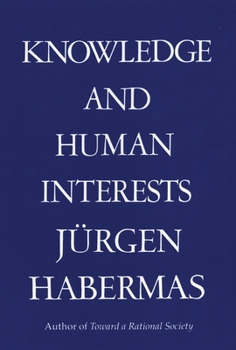Knowledge & Human Interests
Select Format
Select Condition 
Book Overview
Habermas describes Knowledge and Human Interests as an attempt to reconstruct the prehistory of modern positivism with the intention of analysing the connections between knowledge and human interests.... This description may be from another edition of this product.
Format:Paperback
Language:English
ISBN:0807015415
ISBN13:9780807015414
Release Date:February 1972
Publisher:Beacon Press
Length:368 Pages
Weight:1.05 lbs.
Dimensions:1.0" x 5.5" x 8.5"
Customer Reviews
1 rating
climactic transition in thought
Published by Thriftbooks.com User , 18 years ago
Habermas says in an interview that he has basically followed the same research program since 1970--that is, since "Knowledge and Human Interests." (KHI) In many ways, KHI marks the peak of Habermas's effort to carry out the classic program of the critical theory of the Frankfurt School. In this, one crucial question is how to integrate the individual psychology of Freud with the sociology of Marx. Another is how to integrate a generally Darwinian paradigm into the Continental philosophical tradition stemming from Hegel. In KHI, Habermas argues that our "interests," by which he means our basic life concerns--almost in a Maslow-like sense--from survival to meaning, are ultimately evolutionarily rooted. Knowledge does "ride on top of" these interests--thus keeping, barely Marx's distinction between "base" and "superstructure"--in the sense that we want to know things because we are the sort of creature who know in order to survive, to live together, to find meaning in life, etc. But since knowledge--culture in all its forms--is the tool we use, as it were, to meet our needs (to address our interests), what we need to pay attention to in order to meet the needs of our bodies and selves is culture, human understanding. Habermas evidently felt that with KHI he had reached a dead end. During the 1970s (following lectures at Princeton) he set off to ground social theory in social existence--that is, in our relationships as they occur by means of talking with each other. This led to his magnum opus, "The Theory of Communicative Action." His work in the 1980s and 1990s was a defense and elaboration of TCA, especially in the direction of political and legal philosophy. But in my reading of Habermas, he has remained a secular philosopher of hope from his very first writings in the 1950s. Both in terms of tools--for instance, his use, unusual for a Continental, of Anglo-American philosophy of language, and his use, unusual for a philosopher, of empirical sociology and psychology--and in terms of themes--emancipation, freedom from self-delusion, consensual and informed participation as the guarantor against a repeat of the Nazi disaster--he has remained on a life quest to see that his boyhood under Hitler is never repeated. KHI is a major step on that path, an effort to summarize a tradition's ability to contribute before he struck out on his own. It is odd for English-world people because of how seriously he takes Freud and Marx. It is dated in its 1960s references and atmosphere of young revolt and idealistic remaking of society, and in its pre-spirituality craze secularism. But it is a magisterial reading of many European authors, including especially Nietzsche, and by no means of interest only to Habermas scholars. Anyone looking for answers as to how to avoid both tyranny and terror while dealing with globalization and pluralism will benefit from Habermas's struggle with the same issues. Note: not as technical and encumbered by social-scientif




